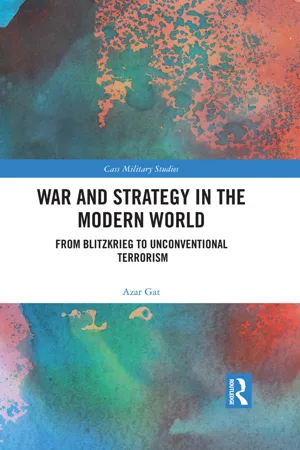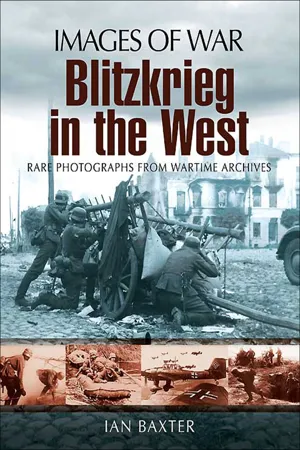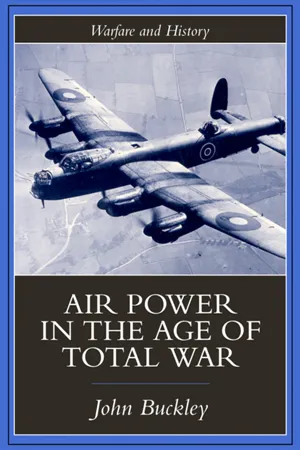Blitzkrieg
Blitzkrieg, meaning "lightning war" in German, was a military strategy used by the German army during World War II. It involved rapid and coordinated attacks using mobile forces, such as tanks and aircraft, to quickly overwhelm and disorient the enemy. The goal was to create a breakthrough in the enemy's defenses and then rapidly advance deep into their territory.
5 Key excerpts on "Blitzkrieg"
- eBook - ePub
War and Strategy in the Modern World
From Blitzkrieg to Unconventional Terror
- Azar Gat(Author)
- 2018(Publication Date)
- Routledge(Publisher)
...Liddell Hart, who referred to the German ‘Blitzkrieg’ and ‘lightning war’ in 1939, even before the war, and later implied that he had invented the concept, was apparently not the only media man to have used the phrase. In July 1940 Militär-Wochenblatt wrote that the term Blitzkrieg ‘stemmed from the ranks of our adversaries and quickly went into currency also with us’. Guderian wrote similarly in his memoirs: ‘as a result of the successes of our rapid campaigns our enemies coined the word Blitzkrieg.’ 157 Being an undefined and retrospective concept, Blitzkrieg could be, and has been, given various and often arbitrary interpretations which regarded it as Germany’s pre-planned strategy – politically, economically, and militarily. The fact that no such overall official doctrine existed does not, however, mean that what came to be known as Blitzkrieg at the beginning of the Second World War did not rest on some real developments and strategic ideas in prewar Germany. Militarily, traditional Prussian-German strategic doctrine (restated in the latest edition of the German field service regulations composed by Beck in 1933–1934) had always emphasized vigorous and offensive action in order to destroy the enemy’s armed forces in great battles. The lessons of the First World War, while highlighting the need for total economic and social mobilization for a protracted war, also added new urgency to the traditional imperative of achieving a rapid decision, so that a war of attrition against a superior enemy coalition could be averted...
- eBook - ePub
- Ian Baxter(Author)
- 2010(Publication Date)
- Pen & Sword Military(Publisher)
...In a number of areas the virtual collapse of the communication system had left many commands isolated, making it difficult for them to establish contact with the fronts. Consequently decisions were almost invariably late and therefore disastrously overtaken by events of one position after another being lost to the Germans. The BEF, however, tried to regain the initiative to the last man and last round, even when they had long since been over-taxed, but coupled with the ineffectiveness of their troops, significantly reduced by the destruction transport, an ultimate catastrophe now threatened the British and French Army. Already the fleeing BEF troops were being mauled almost to death by constant air and ground bombardments. In the confusion and mayhem that engulfed the British and French lines, the troops were struggling to hold back the finest fighting army the world had ever seen. The quality of the German weapons, above all the tanks, was immense importance to Blitzkrieg. Their tactics were the best; stubborn defence, concentrated local firepower from machine-guns and mortars, rapid counter-attacks to recover lost ground. German units often fought on even when cut off, which was not a mark of fanaticism, but great tactical discipline. The invasion of the Low Countries and France was a product of great organization and staff work, and marvelous technical ingenuity. Everything it seemed went according to plan, or even better than the plan in the unfolding both of strategy and tactics. Both Hitler and his staff were confounded by the lightning speed and the extent of their own gains. The overwhelming German air power was decisive to the strategy and this enabled troops to operate with almost total freedom from enemy interferences. Many captured British soldiers complained bitterly about difficulties caused by aircraft and its material damage upon formations in transit...
- eBook - ePub
World War II
A Short History
- Michael J. Lyons(Author)
- 2016(Publication Date)
- Routledge(Publisher)
...CHAPTER FIVE Blitzkrieg in the East, Sitzkrieg in the West Unlike 1914, no great demonstrations of frenzied enthusiasm greeted the outbreak of war in September 1939. Instead, silent resignation prevailed in London, Paris, and even Berlin where American foreign correspondent William L. Shirer observed a mixture of apathy, astonishment, and depression on the faces of German civilians in the streets. The specter of the hideous bloodbath of World War I still loomed over the continent. Britain and France were slow to honor their commitments to Poland. The British did not declare war until 11 A.M. on September 3 when their ultimatum demanding the evacuation of German troops from Poland expired. The French did not follow suit until another six hours had elapsed. In his speech to Parliament that day, Chamberlain glumly declared, “Everything I have worked for, everything I have hoped for, everything I have believed in has crashed in ruins.” There was even less reason for jubilation in Poland where the Poles faced the full brunt of the German attack completely alone. Differing Approaches to War During the opening period of World War II, from September 1939 to November 1941, Germany won a series of spectacular victories and conquered much of Europe. These successes stunned the world and gave the illusion of overwhelming strength. The Germans failed only in their attempt to crush Britain in 1940, but this defeat came in the air. They remained invincible on land. Despite appearances, Germany’s triumphs were not due to overwhelming strength. Hitler’s army was formidable, but considering his ambitious war aims, it was not enormously large. Much of its equipment, including tanks, was not of the highest quality and not especially plentiful. Ironically, the Germans, who revolutionized warfare through mechanization during the 1930s, were short of motorized transport. Only a few of their infantry divisions were motorized...
- eBook - ePub
- John Buckley(Author)
- 2006(Publication Date)
- Routledge(Publisher)
...Paradoxically, the Luftwaffe, despite its apparent trailblazing, disintegrated as the war progressed, being the first casualty of the attritional war into which Hitler had led his state. The roots of German failure and Allied and Soviet success in the air war can in part be traced back to the pre-war years when the foundations of the later massive expansion of the aero-industries began. Aircraft production and development was a microcosm of the war as a whole. The Germans, at a higher state of front-line military readiness in 1939, made their advantages tell, sweeping away inferior powers with bold and risky offensives against which the rearming and ill-prepared British and French could not react quickly enough. However, those that survived such as Britain and the USSR, and those beyond the range of direct German aggression, such as the USA, were able to muster their superior economic strengths and go over to the offensive. While Germany initially proved unwilling and latterly unable to expand its air forces sufficiently, if at all, their opponents, with long-term air expansion and re-equipment programmes already underway, surged ahead of the Nazi state and its diminishing and haemorrhaging air power strength. Confronted with a series of punishing air offensives, over Germany itself, over the Atlantic, and finally in support of the massive land forces which from late 1942 onwards began the inexorable advance on the Nazi state, German strength and power was crushed. Land warfare – Blitzkrieg It is all too often assumed that German air power in World War II was largely deployed in close support of the army, contributing considerably to the success of the armoured offensives which epitomized Blitzkrieg. 1 However, as has already been indicated, the Luftwaffe was a broadly based force with no constricting central doctrine, other than that its resources should be used generally to support national strategy...
- eBook - ePub
Goering
The Iron Man
- Richard Overy(Author)
- 2020(Publication Date)
- Bloomsbury Academic(Publisher)
...Britain and France were defeated on the Continent against the expectations of the German generals and even of the Nazi leaders themselves who, like Goering, believed that the war would not be quickly over, though they hoped that it would. This was Blitzkrieg by default, and it disguised the different time-scale and character that German preparations before 1939 had actually had. The early campaigns also disguised a considerable degree of strategic confusion and uncertainty. The pre-war planning was programmatic in approach. The changed circumstances of war, as might be expected, compromised the achievement of the programme, which had been mistakenly based on the assumption that Hitler would be given a free hand in eastern Europe. The reality of the international situation was that Hitler had to face a major war in the west earlier than he had wanted while remaining uncertain about Stalin’s intentions in the east. There were now, in the middle of 1940, two alternatives for the Nazi leadership. Either to seek a compromise peace and to buy the extra time required for economic and military preparation, or to speed the whole process up and begin the larger racial war sooner than intended, fighting on both fronts at the same time. Goering hoped for the first of these alternatives. Where a compromise peace failed to materialise in October 1939, it seemed much more likely after the defeat of France in June 1940. Goering once again acted as the chief intermediary but with even less effect or enthusiasm than before. 185 Part of the plan was to detach the United States from Britain, which would further weaken British resistance. To this end Goering ordered a German contact in Mexico City to incite the American Mineworkers’ leader to call a general strike in the United States to prevent Roosevelt from actively intervening against Germany. 186 Hitler had little time for all this...




